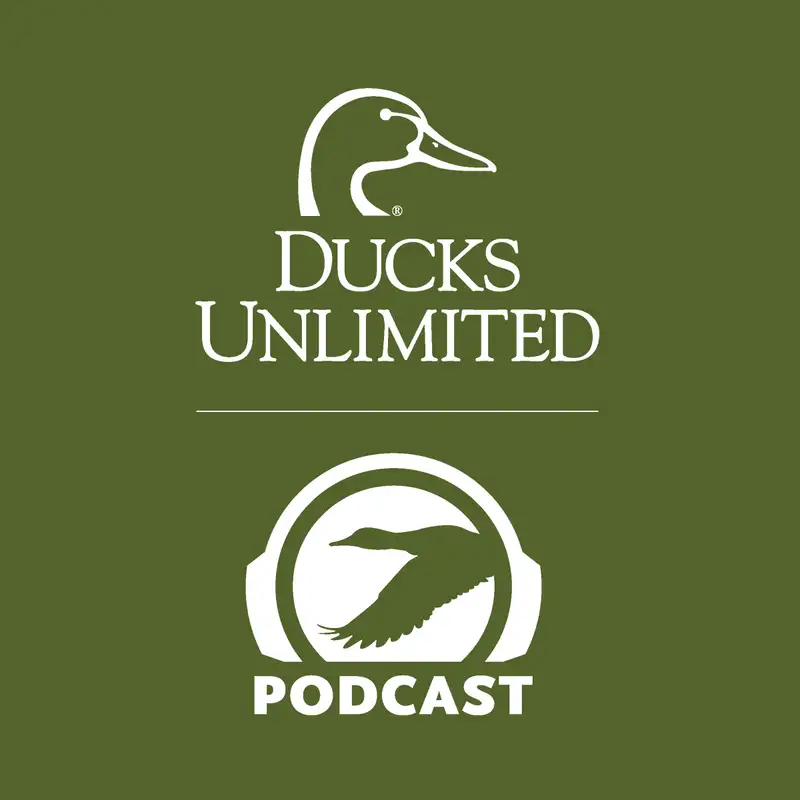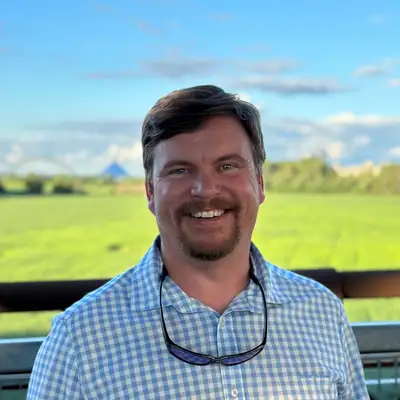BONUS: Migration Alert! Teal On The Move!
Can we do a mic check, please? Everybody, welcome back
VO:to the Ducks Unlimited podcast. I'm your host, doctor Mike Brasher I'm your host, Katie Burke. I'm your host, doctor Jared Henson. And I'm your host, Matt Harrison.
VO:Welcome to the Ducks Unlimited podcast, the only podcast about all things waterfowl. From hunting insights to science based discussions about ducks, geese, and issues affecting waterfowl and wetlands conservation in North America. The DU podcast, sponsored by Purina Pro Plan, the official performance dog food of Ducks Unlimited. Purina Pro Plan, always advancing. Also proudly sponsored by Bird Dog Whiskey and Cocktails.
VO:Whether you're winding down with your best friend or celebrating with your favorite crew, Bird Dog brings award winning flavor to every moment. Enjoy responsibly.
VO:Please stand by. A migration alert has been issued. Repeat. A migration alert has been issued. Please visit ducks.org/alerts for more info.
Matt Harrison:Hey, everyone, and welcome back to the Ducks Unlimited podcast. I'm your cohost, Matt Harrison, and I also have with me one of our other host as well, doctor Jared Henson. Doctor Jared, how are doing?
Jerad Henson:I'm good, Matt. Man, happy to be here. Happy to kinda talk about some some ducks. It's that time of year.
Matt Harrison:No. I am pumped after hearing that intro. My blood is pumping. I'm ready to go chase some ducks somewhere. We're getting so close, and that's what we're gonna be doing today is just giving a little migration alert.
Matt Harrison:What we're gonna try to do is maybe once a week, try to keep it around that same schedule. Try to release some type of migration alert. Give our listeners a update on what we're hearing, what we're seeing, and we have an awesome awesome landing page. On our website at ducks.org is a migration alert. And roughly once a week, we'll release these migration alerts.
Matt Harrison:You can go. You can find out what people are seeing, what people are doing, and it's a great, great way to stay informed and also kinda know what's going on when it comes to waterfowl. So I'm super excited about it. I'm super glad to have doctor Jared joining to just talk ducks. I mean, every week, we get to get on here and just talk about ducks.
Matt Harrison:Aren't you pumped about that, doctor Jared?
Jerad Henson:I'm pretty pumped, man. Like I said, it's that time of year we had some little cooler weather a couple weeks ago. It got everybody excited. And also wanted to kinda add too is as people go to that migration alerts landing page.
Matt Harrison:Absolutely.
Jerad Henson:If you click, you can sign up for alerts
Matt Harrison:Yep.
Jerad Henson:And you'll get them emailed to you as soon as they come out, so you'll be on top of it as soon as we know.
Matt Harrison:A 100%. And thank you for pointing that out. Like you said, this is a great great way to be informed, especially if you're in these certain regions that these migration alerts grow go out. It's a great opportunity just to stay informed. And I highly suggest, like doctor said, go sign up and you get that email shot right to your phone.
Matt Harrison:It's a great way you can just go and and stay up to date. So thank you for pointing that out, doctor Jared.
Jerad Henson:Yeah. Anytime. And I'm I'm excited, like, because as we we go through these, we're gonna break them down. Generally, they're gonna be broken down kinda by flyaways. We'll probably keep buying a few from time to time depending upon weather and events going on, but things are moving.
Matt Harrison:100%.
Jerad Henson:It is it is that time. And so I think today's story is all about little blue rockets.
Matt Harrison:That's it. The Texas teal. We're gonna be over talking about Texas to Texas marsh, and we have an update. We released it last week on our website, and we just have some information to to throw your way. So one of the first things that I do wanna talk about is they said, doctor Jared, that they got a really big push of Blue Wing Teal really early.
Matt Harrison:And that's interesting, you know, because you know as well as I do and and they mentioned this in the article that teal season, it could be here today, gone tomorrow, right, as far as birds in your location. And so with them arriving early in big numbers, there's always that chance that they move out quick. So what are your thoughts kinda on that, you know, with getting them big groups in in early in Texas?
Jerad Henson:That's it. And that's that here today, gone tomorrow is kinda amplified by a little bit shorter season this year, right, since our Yep. Our bluing population fell a little below that 4,500,000 threshold that they need for a sixteen day season. So now everything's a nine day season, so you got two weekends. It's it it makes that that issue a little more amplified.
Jerad Henson:And and one of the the questions I have is we've had that cold front come through in late August. Early.
Matt Harrison:I mean, I remember going outside at my house, and I'm like I know. Is it duck season?
Jerad Henson:I know. We got in the fifties in Memphis, and that's enough to make everybody get real excited real fast. And, you know, you saw that, but it it's you know, that was our false fall kind of little tease. We'll probably have another one before season for us, but before the main, you know, regular duck season, but it's it's warmed back up immensely. The past couple weeks were in the nineties, pretty pretty toasty.
Jerad Henson:Yep. And so I think that kind of spread birds back out, maybe even bumped them back north a little. I don't know if they went back north, but they definitely kinda slowed down as far as those migrations. And one of the questions, know, Blue Wings, one of things is they don't stop at the coast.
Matt Harrison:They keep going.
Jerad Henson:Right? And so that's one of the questions that that we kinda have is this there's another little front coming through this week. I think some states opened up this past weekend. Yep. So I I heard some good good reports.
Jerad Henson:People had some good hunts. But, yeah, does it push birds further down into Mexico or or even South America from there? So
Matt Harrison:Yeah. Which, like you said, I mean and that's what they said in the article as well is with that last week of August, they had a huge push of birds. So, I mean, that's that's holding birds for a long period of time. And and like we've mentioned, with teal, it can be you know, I've literally heard somebody tell me this past weekend, they asked me if I was going out teal hunting. Was like, no.
Matt Harrison:I'm not gonna make it this weekend. But he said, man, we went and found a spot and had, you know, a mass amount of till. And he said we went back and it was like a tenth of the birds that were there. So it's just one of those things that it can be really good one minute and not really good the next. But one one thing that stuck out, and you talked about this a little bit too, doctor Jared, is, you know, typically, they had a sixteen day season, and now it's down to the nine days.
Matt Harrison:So they lost that week. And not only that, it is now the last they were saying in the article that the last seven or eight days normally are a grind in Texas for till season depending on where you're at. You know, and some people may say that's their best days, but with the season now being those last two weekends, saying it may be tough on some, you know, if those birds have moved out. Now again, we know Texas, you know, typically holds a lot of blue wing too and a lot of people do really, really well during that time. But saying with that shorter season, with it being those last two weekends, some people may struggle a little bit there.
Jerad Henson:Yeah. Yeah. And that's you know, it's always interesting to see kind of how that pans out. I think one of the things that was pointed out in the article that I thought was pretty interesting too is that the Prairies, the the Texas Prairies, you know, that area around El Campo was was holding birds, you know, early Yep. Like you mentioned, but those birds are trickling to the coast now.
Jerad Henson:Birds are showing up more and more on the coast, and so they're moving, it doesn't take them long.
Matt Harrison:100%. And they they were also saying that it's been a real wet summer on the Texas coast. And they said some counties, you know, have been have been pretty dry, but for the majority of it that they they had a wet summer, which is great, you know, but a lot of the birds may be concentrated in some areas because they did say some counties were dry and and and not not looking too hot for for, you know, some areas with water. So they said a lot of those numbers that they're seeing may be concentrated numbers. You know, and that's that's typically the the the case for a lot of different scenarios.
Matt Harrison:You know, if you have water in one area and not in another, you're gonna be holding the birds. So if that's the case in Texas as well, if they've, you know, had some counties that are that are dry that may typically have water, they're not gonna have the birds. No no water, no birds.
Jerad Henson:That's it. And if if you are in one of those dry areas, it seems like birds are gonna be there on any permanent water that may still be around. So if you they've, you know, some moist soil impoundments or some some ponds, something something like that will hold a few birds, but they're not gonna hold them long. Right? Because it's it's there's not a lot of habitat for them to spread out, and especially as soon as that hunting season starts.
Jerad Henson:Yep. There's not a lot of places for a bird to go to get away at that point, so they're gonna move on to the next place.
Matt Harrison:Yep. That's a good point. Doctor Jared, if you just and this is kinda getting off just a little bit, but I just kinda want you to elaborate because we did talk about, you know, Texas had a lot of birds early. What are some causes that may make them move out? Now I know we have weather.
Matt Harrison:I know we have food, but, you know, with them arriving so early, what would you say the number one number one at the top of the list would be that would cause those big groups of Blue Wing Teal to move out or, you know, fly fly further back north, go further south? What are just some of the top few things that you would say would be pretty detrimental to those groups moving out?
Jerad Henson:Yeah. Well, I'll back up just a little bit. I mean, everybody pretty much on here knows that that blue wings are a little different than a lot of, know, our bigger ducks. Right? So they're obligate migratory birds, more or less, and and they really migrate on photoperiods.
Jerad Henson:So time of year is a big deal to them, and that's what really gets them antsy's probably the right word.
Matt Harrison:Mhmm.
Jerad Henson:So they get, you know, August, early September, they start to get anxious, antsy, ready for migration, and any any factor that facilitates migration, right, wind direction, cool front, full moon at night, all of those things are are anything that's gonna get them to move. They they want to go, they're ready to go, they're they're just waiting on the waiting on the appropriate conditions to go. And so so that's what starts it. Right? And that's all the way through their migration.
Jerad Henson:As we mentioned, they don't stop at the coast. Some do, but some of those blue wings are gonna keep going. And so any of those factors, a cool front, a good north wind, a full moon, because most of those teal are gonna migrate at night, any of those things can be a factor that will lead to ducks moving out, but they're also gonna hopefully, as long as you're not on the tail end of the migration, bring more ducks in too. Right? Correct.
Jerad Henson:So those are the things that I would be paying attention to. And then at a local scale, right, if you get a rain event, even if it's not that cold or something like that, and you get a lot of water on the landscape like we've we've had the past weekend, and then you get a couple more rain showers coming this week, let's go spread ducks out. Yeah. So that's another factor too.
Matt Harrison:That's a good point. You know, and I've never really thought about bluing teal being that bird, but now, you know, thinking about teal, thinking about how they can just move in, move out, the first to show up, the first to leave, you nailed it. They're just a bird that's kinda waiting for the opportunity to get up and move.
Jerad Henson:Yeah. It's in the bird world, there's a there's a term for it for migratory restlessness, but they're they're antsy.
Matt Harrison:Very, very, very antsy birds. And here's the thing, though. And it's like I tell my brother all the time, you don't know unless you go. So if you got an opportunity to go chase some teal, you know, get out there whether they moved out or not. You never know because, doctor Jared, you know this as well, you have a a group of a 100 blue wing teal buzz you.
Matt Harrison:If you got some decent shots in there, you can knock some out. So, you know, get out there, go. You know, Texas is typically a great state to chase blue winged teal in. They normally have very, very large numbers. And like you said, typically, if you have, you know, bodies of water that stay there, you're you may have some blue winged tail hanging out.
Matt Harrison:So if you get the opportunity to go out, chase some, go get after them.
Jerad Henson:That's it. You know, knock the knock the dust off that gun and and your waiters and and get out there and chase them. They're they're one of the most fun birds to hunt. They do quite amazingly well. They're big bunches.
Jerad Henson:They They fly work. Yeah. It's it's it's a super exciting hunt. If it's not something you you've ever done, I encourage you to jump in and give it a try. Yeah.
Jerad Henson:It can be a little mosquito y or or buggy this time of year, maybe even a few snakes, but but it's a it's an awesome time of year, and it like I said, it's that it's that teaser before the the big
Matt Harrison:It is. The big show. And you nailed it. Knock the dust off your shooting. You know, it's a great opportunity.
Matt Harrison:You can hit blue wing tail. I'd say you can just about hit any duck out there. So get out there, chase them. But well, doctor Jared, thank you so much. Thank our listeners also for tuning in.
Matt Harrison:Also, reminder, as doctor Jared mentioned at the beginning of this episode, that if you want to stay up to date on these migration alerts, you can follow along with the podcast, me and doctor Jared, but also make sure you go to ducks.org, find our migration alert section, and you can sign up there to be informed through email. So it's a great, great way to also get that article. You can read about what we just discussed. It goes into detail a little bit more, but you can also tune in to the Ducks Summit podcast because now we will be giving you migration alert updates as well. But doctor Jared, thank you so much for hopping on talking about some ducks.
Matt Harrison:I'm super excited about the rest of the season. We get to get on here and and get to talk about duck hunting. So what better opportunity that we have. So thank you so much, doctor Jared. Also, thanks so much to our podcast producer, Chris Isaac.
Matt Harrison:Thank you all so much for our listeners for tuning in to Ducks Unlimited podcast. We cannot thank you enough. Y'all take care and God bless.
VO:Thank you for listening to the DU podcast sponsored by Purina Pro Plan, the official performance dog food of Ducks Unlimited. Purina Pro Plan, always advancing. Also proudly sponsored by Bird Dog Whiskey and Cocktails. Whether you're winding down with your best friend or celebrating with your favorite crew, Bird Dog brings award winning flavor to every moment. Enjoy responsibly.
VO:Be sure to rate, review, and subscribe to the show and visit ducks.org/dupodcast. Opinions expressed by guests do not necessarily reflect those of Ducks Unlimited. Until next time, stay tuned to the Ducks.


